
Rawalpindi is a city in the Punjab province of Pakistan. It is the fourth largest city in Pakistan after Karachi, Lahore and Faisalabad, and third largest in Punjab after Lahore and Faisalabad. Rawalpindi is next to Pakistan's capital Islamabad, and the two are jointly known as the "twin cities" because of the social and economic links between them.
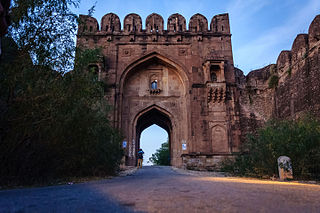
Jhelum District, is partially in Pothohar Plateau, and partially in Punjab Plain of the Punjab province of Pakistan. Jhelum is one of the oldest districts of Punjab. It was established on 23 March 1849. According to the 1998 census, the district had a population of 936,957, of which 31.48% were urban. Jhelum District has a diverse population of 1,103,000 (2006). Jhelum is known for providing many soldiers to the British and later to the Pakistan armed forces due to which it is also known as 'city of soldiers' or 'land of martyrs and warriors'. The district of Jhelum stretches from the river Jhelum almost to the Indus. Salt is quarried at the Mayo mine in the Salt Range. There are two coal mines in the district from which the North-Western railway obtains parts of its supply. These are the only coal mines in Punjab province which are in working condition. The chief center of the salt trade is Pind Dadan Khan. The district is crossed by the main line of the North-Western railway and also traversed along the south by a branch line. It is located in the north of the Punjab province, Jhelum district is bordered by Sargodha and Mandi Bahauddin to its south, Khushab to its southwest, Jhelum River to its south and east, Gujrat to its east, Chakwal to its west, Mirpur to its northeast, and Rawalpindi to its north.

Rawalpindi District is a district located in the northernmost part of the Punjab province of Pakistan. Parts of the district form part of the Islamabad Rawalpindi metropolitan area. Rawalpindi city is the district capital.

Rawalpindi is a tehsil - an administrative subdivision - of Rawalpindi District in the western part of the Punjab province, Pakistan, it contains the district capital - the city of Rawalpindi.
Kauntrila (Urdu:کونتريله) is the name of a village and union council of Gujar Khan Tehsil in Rawalpindi District, Punjab, Pakistan. Kauntrila is a populated small town among few of old qasbas in Tehsil Gujar Khan. It is also an active union council of Gujar Khan Tehsil.
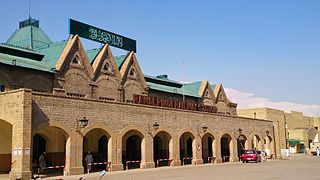
Rawalpindi Railway Station is located in Saddar area of Rawalpindi, Punjab, Pakistan. It is one of several major stops on the Karachi–Peshawar Railway Line. The nearest Saddar Metrobus Station, part of the Rawalpindi-Islamabad Metrobus is 20 minutes (1.5 km) walk away.
Sukho is a Union Council of Gujar Khan, Rawalpindi District, Punjab, Pakistan. It is located 3.5 km south of the Sukho Mor stop at the Mandra-Chakwal Road and is connected with Gujar Khan (12.5 km) via Sukho-Gujar Khan Road.
The Rawalpindi Rams was a domestic Twenty20 and List A cricket team, based in Rawalpindi, Punjab, Pakistan. The team was established in 2004–05 and its home ground was the Rawalpindi Cricket Stadium.

Bhata بھاٹہ is a village in Pakistan which is located in the centre of Mandra-Chowk Pindori Road, Tehsil Gujar Khan District Rawalpindi.
Saddar, Rawalpindi, Pakistan, is the main commercial hub of Rawalpindi Cantonment. It is located between the Mall road and the main railway lines connecting Rawalpindi with down-country. It has some major business and commercial centres, main branches of major Pakistani banks, and residential areas of British colonial era. Saddar is a home to a dense cluster of residential and commercial buildings. Shops as well as shopping malls offer a diverse range of locally manufactured products and imported items. Chota Bazaar is a famous shopping area in northern Saddar.
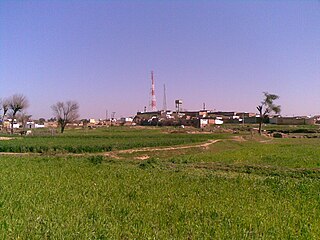
Gulyana is a town in Gujar Khan Tehsil, Punjab, Pakistan. Gulyana is also chief town of Union Council Gulyana which is an administrative subdivision of the Tehsil.
Kot Suleman is small part of village Dhoong near village Trati in Union Council Narali located in Gujar Khan Tehsil, District Rawalpindi, Punjab, Pakistan. It has a population of 250. Kot Suleman is a historic town of Village Dhoong, Rawalpindi District. Kot Suleman is famous for its natural reserves of oil and natural gas.
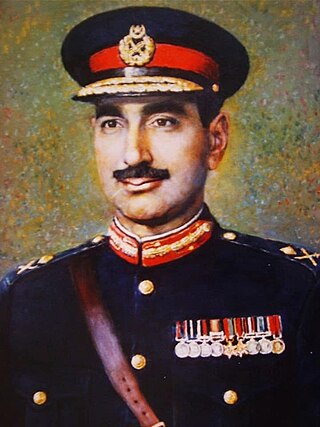
Major General Raja Muhammad Anwar KhanHJ was the first Pakistan Army Engineer Officer and the first Muslim Engineer In Chief of the Pakistan Army. He was the first Muslim to be a Sapper officer in the British Indian Army and its pre-partition Indian Corps of Engineers. His Pakistan Army number was 48 (PA-48).
Rupper Kalan is a village situated in Rawalpindi Tehsil near Chak Beli Khan in Rawalpindi District, Punjab, Pakistan. It is roughly 40 km (25 mi) from Rawalpindi City.
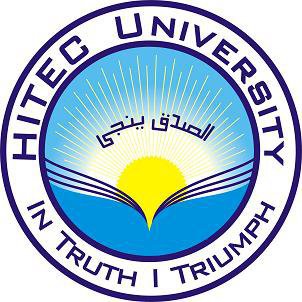
HITEC University is a private university located in Taxila Cantonment, Punjab, Pakistan.
The 2005–06 ABN-AMRO Twenty-20 Cup was the second edition of the ABN-AMRO Twenty-20 Cup, a domestic Twenty20 competition in Pakistan. It was held in Karachi from 24 February to 4 March 2006. This edition featured an expanded format, with an increase from 19 to 39 matches and from 11 to 13 teams; the new teams being the Islamabad Leopards and the Abbottabad Rhinos. The Sialkot Stallions won the tournament by defeating the defending champions the Faisalabad Wolves in the final.
The following lists events that happened during 2015 in Pakistan.
Jherain is a village near the town of Mandrah in Tehsil Gujar Khan, District Rawalpindi, Pakistan. The village is at 5 km from the GT Road. Its population is approximately 30,000 inhabitants. Most of the people connected to farming. Wheat, peanut, barley and vegetables are major crops. A little majority are employed in government jobs. The village lacks of basic education and health facility. There is no college, dispensary or bazar. Although it has basic infrastructure of roads and streets. Pre-partition of Indo-Pak along with Muslims, Hindus and Sikhs also resided here. Social life of people depicts Muslim and Pakistani culture. A notable personality, Ch. Lall Khan, (Late) of this village struggle for the welfare of people. They established a Govt High School (Bhatta) and cemented many streets with the aid of local Government.
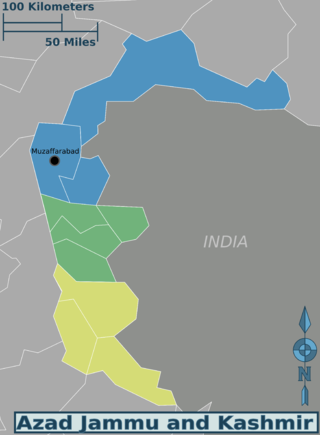
In spring 1947, an uprising against the Maharaja Hari Singh of Jammu and Kashmir broke out in the Poonch jagir, an area bordering the Rawalpindi district of West Punjab and the Hazara district of the North-West Frontier Province in the future Pakistan. The leader of the rebellion, Sardar Muhammad Ibrahim Khan, escaped to Lahore by the end of August 1947 and persuaded the Pakistani authorities to back the rebellion. In addition to the backing, Prime Minister Liaquat Ali Khan authorised an invasion of the state, by the ex-Indian National Army personnel in the south and a force led by Major Khurshid Anwar in the north. These invasions eventually led to the First Kashmir War fought between India and Pakistan, and the formation of Pakistan administered Kashmir. The Poonch jagir has since been divided across Kashmir, administered by Pakistan and the state of Jammu and Kashmir, administered by India.









